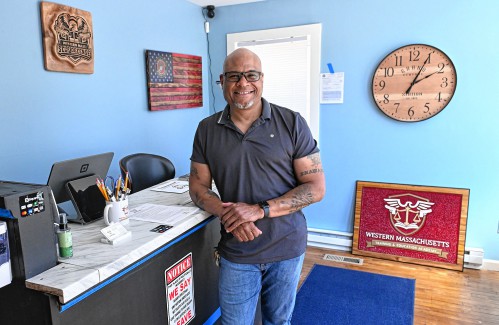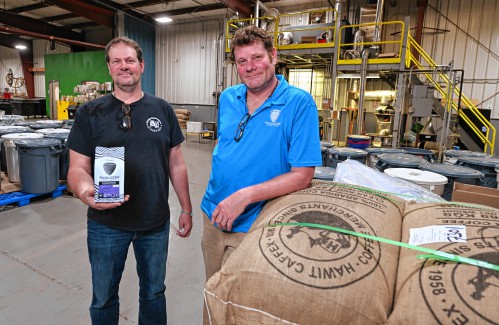Latest News
 As I See It: Of dogs and men
As I See It: Of dogs and men
 Beacon Hill Roll Call: May 6 to May 10, 2024
Beacon Hill Roll Call: May 6 to May 10, 2024

$338K fraud drains town coffers in Orange
ORANGE — Authorities are investigating an estimated $338,000 in fraud against the town, which has left Orange in dire financial straits and could result in the closure of its libraries, town officials discussed Thursday.The fraud involves the town...

Charlemont planners approve special permit for Hinata Mountainside Resort
CHARLEMONT — The town’s newest attraction could begin welcoming people as soon as May 2025 after the Planning Board granted a special permit to Hinata Mountainside Resort off of Warfield Road.With drafted conditions laid out at the previous week’s...
Most Read
Editors Picks
 PHOTOS: 22 years of sharing wellness resources in Greenfield
PHOTOS: 22 years of sharing wellness resources in Greenfield
 ‘A generational healing experience’: Exhibit documents the struggles of Cambodian families fleeing the Khmer Rouge who found refuge and a new community in Amherst
‘A generational healing experience’: Exhibit documents the struggles of Cambodian families fleeing the Khmer Rouge who found refuge and a new community in Amherst
 Dog of the Week: Robin
Dog of the Week: Robin
 South County Notebook: May 18, 2024
South County Notebook: May 18, 2024
Sports

Mohawk Trail’s Chay Mojallali sets school record in high jump as Franklin County contingent racks up titles at Western Mass. Division 2 Track & Field Championships (PHOTOS)
BUCKLAND — Mohawk Trail’s Chay Mojallali put on a show Friday on his home track during the Western Mass. Division 2 Track & Field Championships.Mojallali entered the day as the top seed in the boys high jump and made sure he didn’t get upset. The...
 High Schools: Ethan Heuer’s 10 strikeouts lift Athol baseball past Gardner
High Schools: Ethan Heuer’s 10 strikeouts lift Athol baseball past Gardner
 Keeping Score with Chip Ainsworth: Without Muth, Preakness looks wide open
Keeping Score with Chip Ainsworth: Without Muth, Preakness looks wide open
Opinion

Connecting the Dots: ‘They can say they don’t care, but they can’t say they didn’t know’
“Sometimes it is almost impossible not to feel hopeless and broken,” says climate scientist Ruth Cerezo-Mota. “After all the flooding, fires, and droughts of the last three years worldwide, all related to climate change, and after the fury of...
 Karen Traub: What it means when you lose a public library
Karen Traub: What it means when you lose a public library
 My Turn: Too often, what we got sold not what we got
My Turn: Too often, what we got sold not what we got
 Bill Knittle: Rowe Elementary is looking for people with a cool job
Bill Knittle: Rowe Elementary is looking for people with a cool job
 My Turn: Unwelcome gift in mailbox — A flag that won’t be flying
My Turn: Unwelcome gift in mailbox — A flag that won’t be flying

Business

Hotfire Bar and Grill to open Memorial Day weekend in Shelburne Falls
SHELBURNE FALLS — The former site of the organic restaurant Hearty Eats at 24 Bridge St. is being transformed into Hotfire Bar and Grill, serving burgers, an eclectic array of sandwiches and comfort foods like macaroni and cheese and chicken...
 Retired police officer, veteran opens firearms training academy in Millers Falls
Retired police officer, veteran opens firearms training academy in Millers Falls
 Goddard finds ‘best location’ in Shelburne Falls with new Watermark Gallery space
Goddard finds ‘best location’ in Shelburne Falls with new Watermark Gallery space
 New buyer of Bernardston’s Windmill Motel looks to resell it, attorney says
New buyer of Bernardston’s Windmill Motel looks to resell it, attorney says
Arts & Life

‘As the woods wake up, it’s my favorite time’: Turkey hunters relish spring season
The Boston Red Sox season will still be warming up by the end of this month, with about 110 games remaining before the playoffs. But outdoor sportsmen across Massachusetts will have already hung up their gear until around the time the World Series...
Obituaries
 Louis D. Manica
Louis D. Manica
Greenfield, MA - Louis D. Manica, 77, passed away peacefully on Saturday, May 11, 2024 after a period of declining health, with his loving family by his side. Louie was born in Greenfield, MA on May 20, 1946 the son of Louis C. and ... remainder of obit for Louis D. Manica
 Albert H. Rimbach
Albert H. Rimbach
Ashfield, MA - Albert H. Rimbach, Jr., 76, of Creamery Rd., passed away May 13, 2024 at Baystate Medical Center in Springfield. Al was born in Rockland County, NY on May 22, 1947 the son of Albert H. and Helen (Mathewson) Rimbach. ... remainder of obit for Albert H. Rimbach
 Judith A. McCarthy
Judith A. McCarthy
Judith "Judie" A. McCarthy Greenfield, MA - Judith Ann (Clarke) McCarthy, 82, of Albert Ave died Monday 5/13/24 at home. She was born in Greenfield on January 23, 1942, the daughter of Franklin and Florence (Demers) Clarke. Judie attende... remainder of obit for Judith A. McCarthy
 Constance Towler
Constance Towler
Constance "Connie" Towler Greenfield, MA - Constance (Fassell) Towler, passed away peacefully on April 30th after a brief illness. At the time of her passing, Connie had been residing at Regal Manor in Greenfield, MA. She was born in Ada... remainder of obit for Constance Towler

 Greenfield residents allege sound and odor issues from candle, cannabis businesses
Greenfield residents allege sound and odor issues from candle, cannabis businesses
 DCR highlights $1.5M in Mohawk Trail State Forest Campground upgrades
DCR highlights $1.5M in Mohawk Trail State Forest Campground upgrades
 Mohawk Trail Regional School’s Tierney honored as promising new teacher
Mohawk Trail Regional School’s Tierney honored as promising new teacher
 Comic book fans invited to ‘a little family reunion’ with Sunday’s Western Massachusetts Comic Book Show
Comic book fans invited to ‘a little family reunion’ with Sunday’s Western Massachusetts Comic Book Show
 Resilient Greenfield aims to unite community in face of climate change
Resilient Greenfield aims to unite community in face of climate change
 Greenfield City Council approves $64.87M budget, votes down proposed cuts
Greenfield City Council approves $64.87M budget, votes down proposed cuts
 Health care gaps create reentry hurdle for incarcerated individuals
Health care gaps create reentry hurdle for incarcerated individuals
 High Schools: Greenfield softball enters postseason with 17-1 record following win over Easthampton
High Schools: Greenfield softball enters postseason with 17-1 record following win over Easthampton  Bulletin board: Franklin First goes on hit parade in GGSL victory
Bulletin board: Franklin First goes on hit parade in GGSL victory Fogbuster Coffee Works, formerly Pierce Brothers, celebrating 30 years in business
Fogbuster Coffee Works, formerly Pierce Brothers, celebrating 30 years in business Sounds Local: Greenfield’s own Elvis returns to sender: Travis Ledoyt brings ‘The Elvis in Me’ to Greenfield High School, May 25
Sounds Local: Greenfield’s own Elvis returns to sender: Travis Ledoyt brings ‘The Elvis in Me’ to Greenfield High School, May 25 The cool new ‘underground’ spot in town: Le Peacock in Shelburne Falls delivers on colorful décor, people, food and cocktails
The cool new ‘underground’ spot in town: Le Peacock in Shelburne Falls delivers on colorful décor, people, food and cocktails Get Growing with Mickey Rathbun: Venture beyond your garden walls: Plant sales and noteworthy gardens to visit this season
Get Growing with Mickey Rathbun: Venture beyond your garden walls: Plant sales and noteworthy gardens to visit this season Speaking of Nature: Surprised by strawberries in the grass: Flowers will bloom whether you pay attention or not
Speaking of Nature: Surprised by strawberries in the grass: Flowers will bloom whether you pay attention or not
